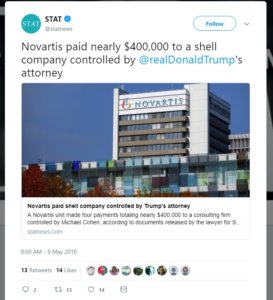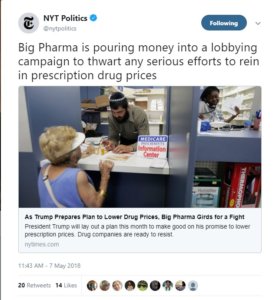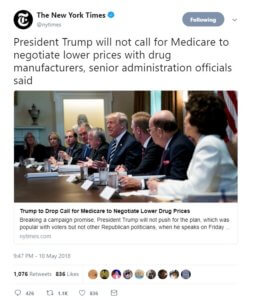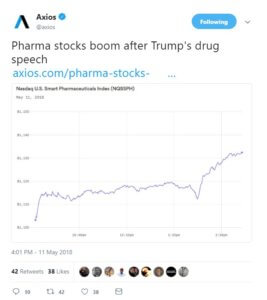Washington, D.C. – After new research from Avalere and a CBS News investigation exposed the dangers seniors with cancer could face under the Trump Administration’s drug pricing blueprint, Protect Our Care Campaign Director Brad Woodhouse said:
“The Administration has no answers on how its proposed changes to Medicare would protect seniors from prohibitively high out-of-pocket costs for specialized cancer treatment. This is more proof that the Trump Administration’s drug pricing ‘plan’ is a day late and a dollar short. Americans are already worried enough about rising health care costs; let’s not find new ways for the Trump Administration to make care more expensive.”
A tricky wrinkle in Trump’s Medicare Rx “Blueprint”
CBS News // Walecia Konrad // May 22, 2018
The Trump administration’s “Blueprint” to lower drug prices and reduce patient costs made one thing clear: The government will not directly negotiate with drug companies to secure lower prescription prices. But that doesn’t mean it isn’t proposing changes that would dramatically alter the way Medicare pays for some of the most expensive drugs, and in the process, potentially raise out-of-pocket costs for some of the country’s sickest patients.
A cornerstone of the Trump plan calls for all Medicare drug payments to be consolidated under Medicare Part D, the prescription drug plan for Medicare enrollees administered by private insurers. Under Part D, insurers and middlemen known as pharmacy benefit managers (PBMs) negotiate with drug companies for discounted prices in exchange for the drug companies’ products being included in the PBMs’ list of covered drugs.
But drugs intravenously administered in physicians’ offices, such as chemotherapy and vaccines, are usually covered as a medical treatment under Medicare Part B. Physicians buy these drugs directly from manufacturers, and Medicare reimburses doctors for the drugs’ average sales price plus 6 percent.
Alex Azar, Health and Human Services secretary and former president of the U.S. division of pharmaceutical giant Eli Lilly (LLY), has been touting the move to consolidate Medicare drug payments during several public appearances since he and President Trump unveiled the Blueprint earlier this month. Azar and other proponents of the plan point out that the 6 percent markup included in Medicare Part B creates incentives for doctors to purchase more expensive drugs to get a higher dollar profit. Better, said Azar, for insurance companies and PBMs in Medicare Part D to negotiate discounts and lower prices.
Pharmaceutical companies are against the idea, partly because they generally are paid more under Part B than Part D. “Bringing negotiation to Part B drugs is such a potent way to bring down prices that PhRMA is already protesting the idea,” Azar said in a recent speech at the American Enterprise Institute in which he referred to the drug industry trade group called Pharmacuetical Research and Manufacturers.
But Azar and others have shed little light on exactly how this change would take place, leaving patients worried about the potential for astronomically higher out-of-pocket costs.
Sky-high co-pays?
“If they shift Medicare Part B medicines to Medicare Part D without making any changes in the Part D structure, it will have a horrible effect on patients,” said David Mitchell, president and founder of Patients for Affordable Drugs. Mitchell, who’is currently undergoing cancer treatment, noted that he and most cancer patients with Medicare Part B have supplemental insurance that covers out-of-pocket costs, including drug co-pays, incurred under Medicare Part B insurance.
Mitchell points to his own regimen of cancer drugs, which adds up to about $23,000 each time he visits the infusion clinic. He pays $2,100 a year for a supplemental policy that covers his Part B co-payments. Medicare Part D recipients are not eligible to buy supplemental prescription drug insurance.
If his drugs were to fall under Medicare Part D, Mitchell explained that he would quickly pay enough in out-of-pocket co-pays to fall into a category called catastrophic coverage. Once in that category, Mitchell would pay 5 percent of his drug costs, which he estimates would equal about $15,000 in a year’s time. “That’s a completely unaffordable amount,” he said.
An analysis released Monday from health care consultants Avalere Health backs up Mitchell’s point. In 2016, average out-of-pocket costs were about 33 percent higher for Part D-covered new cancer therapies than for those covered in Part B. “Medicare beneficiaries typically have lower out-of-pocket costs in Part B — especially since so many seniors carry supplemental coverage,” said Richard Kane, senior director at Avalere, in a press release. “Any proposal for shifting drugs to Part D needs to account for these differences.”
Logistical problems
“Having a doctor purchase, mix and handle the infusion of a drug is a completely different medical experience than going to the pharmacy and picking up a bottle of pills,” said Marc Samuels, founder of ADVI Health and former White House health policy adviser for President George H.W. Bush. Cancer treatments and other physician-administered drugs are complicated and personalized, often changing from week to week or even day to day depending on the patient’s reaction to the drugs.
Patients and physicians are wondering how the actual delivery of drugs would work. “I heard someone say that I’d have to go to the pharmacy to pick up my drugs then bring them to the infusion center,” Mitchell of Patients for Affordable Drugs said. “That isn’t going to work.”
What’s more, Samuels argued that the 6 percent markup that doctors receive under Medicare Part B isn’t as profitable as it may sound. Doctors purchase these expensive drugs then often have to discard them because the patient has serious side effects or needs a different drug for another reason. “The 6 percent is designed to help cover that cost,” Samuels said.
For now the Trump administration isn’t disclosing any details about how this part of its Blueprint would work. “I’m hoping,” said Mitchell, “we can work with the administration to find a way to allow negotiations to take place without harming patients.”





